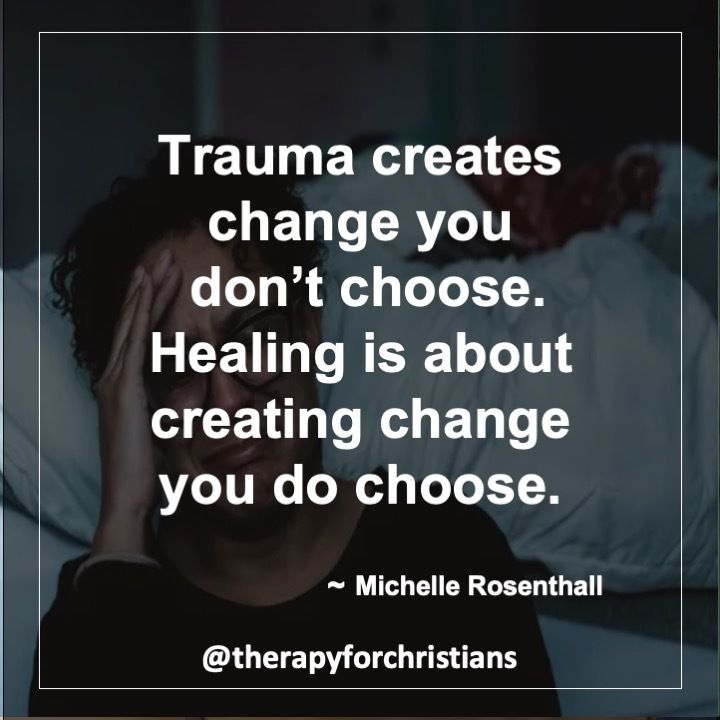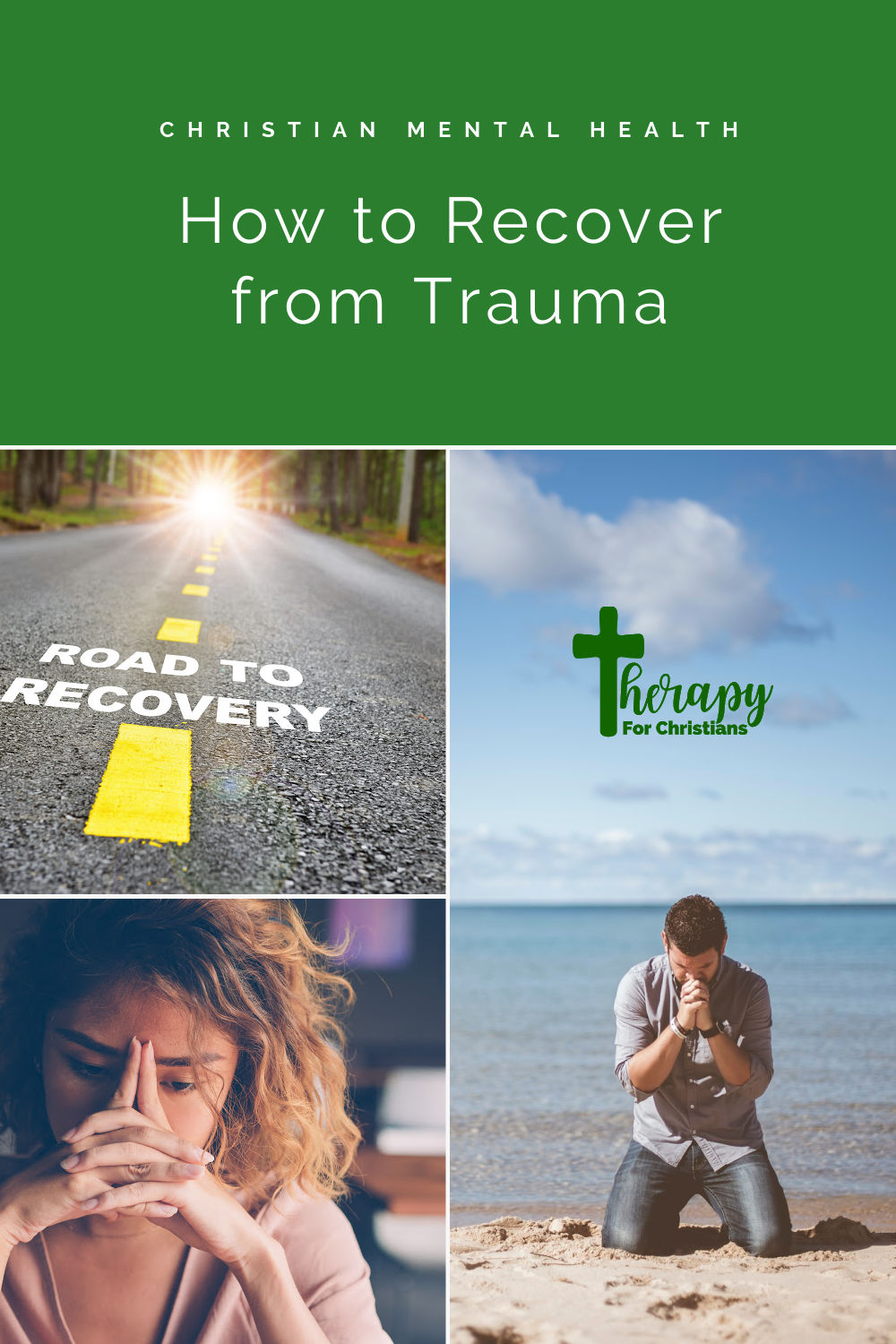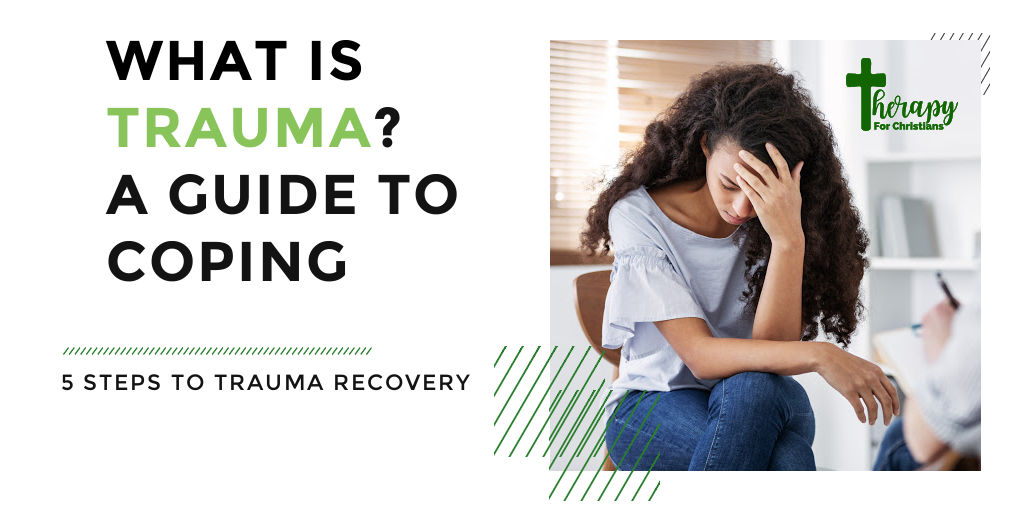
You probably landed on this article because you are looking to understand what is trauma and/or how to deal with trauma? This article includes a basic overview of trauma as well as Post Traumatic Stress Disorder (PTSD) from a Christian therapist's perspective.
What is Trauma?
Before we begin I think it is really important that we have a shared definition of trauma. One of the trauma experts in the mental health field said that a "Traumatic events overwhelm the ordinary human adaptations to life…they confront human beings with the extremities of helplessness and terror.” Judith Herman. However, I like the below definition of trauma:
A trauma is any event that changes for the worse the way you see yourself, other people, the world or God.

What Causes Traumas ?
Trauma results from experiencing a highly stressful event. One that you felt frightened or distressed in but had little to no control over. These events can be one-time situations like an injury or accident. Or it could be ongoing stress, like abuse, living with a life-threatening disease, or losing a loved one.
In order to be consider a trauma, the event has to leave you feeling helpless and insecure. You may feel like you failed yourself or that God has failed you and it takes a toll on your emotional health.

What are Some Common Traumatic Events?
Traumatic events can vary greatly and are subjective experiences that can have a significant impact on individuals. Here are some common examples of traumatic events:
Natural disasters: Such as earthquakes, hurricanes, floods, wildfires, tsunamis, or tornadoes. These events can cause destruction, loss of life, and displacement, resulting in physical and psychological trauma. These events can also shake an individuals faith and lead to feelings of fear, loss, and questioning God's plan.
Accidents: Serious car accidents, plane crashes, train derailments, or workplace accidents can lead to severe injuries or loss of life, causing trauma for those involved or witnesses. When accidents happen, people may grapple with why God allowed such an event to happen and seek guidance in finding purpose and healing.
Violence and abuse: Physical, sexual, or emotional abuse, domestic violence, assault, or witnessing violence can all be profoundly traumatic experiences. When someone experience violence and abuse, they may struggle with forgiving their abusers, understanding God's role in their suffering, and finding restoration in their faith.
War and conflict: Living in or fleeing from war zones, experiencing combat situations, or being a victim of terrorism can have long-lasting traumatic effects on individuals. War and conflict often causes people to question God's presence amidst the chaos and seek solace in their faith while grappling with the profound loss and trauma of war.
Medical trauma: Experiencing life-threatening illnesses, undergoing invasive medical procedures, or witnessing traumatic medical events can lead to significant emotional distress and can test one's faith and raise questions about God's plan for their life.
Sexual assault and rape: These traumatic experiences can have long-lasting effects on survivors, including post-traumatic stress disorder (PTSD) and other psychological and emotional difficulties.
Childhood trauma: Adverse childhood experiences such as neglect, physical abuse, sexual abuse, parental substance abuse, or growing up in a violent or unstable environment can have profound and long-lasting effects on a person's development and well-being, as well as an individual's faith and spiritual development.
Loss and grief: The death of a loved one, especially sudden or traumatic deaths, can cause significant emotional trauma and grief. When one experience the loss of a loved one, they may wrestle with questions about the afterlife, God's purpose in their loved one's passing, and finding comfort and strength in their faith during the grieving process.
Terrorism and mass shootings: Being a victim or witness to acts of terrorism or mass shootings can result in severe trauma due to the sudden and extreme violence involved. Christian individuals who have experienced or witnessed acts of terrorism or mass shootings may grapple with questions of God's sovereignty, the existence of evil, and finding hope and peace in a broken world.
Displacement and refugee experiences: Being forcibly displaced from one's home due to war, persecution, or natural disasters can result in traumatic experiences and ongoing psychological distress. Experiencing displacement may also cause feelings of uncertainty and it can be challenging to maintain one's faith in unfamiliar and often hostile environments.
It is important to note that individuals may respond differently to traumatic events, and the impact can vary based on factors such as resilience, support systems, and coping mechanisms. Seek professional help if you or someone you know has experienced a traumatic event and is struggling to cope with its effects.
What is Post-Traumatic Stress Disorder?
People often use the terms trauma and post-traumatic stress disorder interchangeably; however, they are not the same.
Post-traumatic stress disorder is a psychiatric mental health problem that affects around 6-10% of the US population and manifests itself after a stressful experience, whether actual or perceived.
Other mental health issues, such as depression, anxiety, schizophrenia, or substance misuse disorders, are frequently associated with PTSD. In fact, approximately 80% of PTSD patients are additionally diagnosed with at least one other psychiatric disease during their lifetime.
While the mental science behind the development of PTSD is not fully known, it appears to involve three major brain cortexes. The prefrontal cortex, hippocampus, and amygdala are the three cortexes. There is also a chemical imbalance involving norepinephrine and glucocorticoid levels, according to research. The larger the chemical imbalance in these three brain regions, the more severe the PTSD symptoms.

What Symptoms are caused by Experiencing a Trauma
Because people process trauma differently, each person's experience is as unique as they are. As a result, everyone will have somewhat different symptoms.
Reexperiencing Symptoms
Reexperiencing symptoms include reliving the event through nightmares; flashbacks (i.e., nightmares that are experienced while the person is awake) or frightening thoughts. Reexperiencing the trauma can also cause physical symptoms like sweating, heart palpitations, and anxiety.
Avoidance Symptoms
People who have experienced a trauma may avoid sounds, objects, and places that remind them of the traumatic event. For example:
avoiding places, situations, or things that remind you of the traumatic experience
avoiding thoughts or feelings related to the traumatic event
Arousal and Reactivity Symptoms
These symptoms are frequently persistent. They might make daily tasks, like concentrating, sleeping, or relaxing difficult.
Examples of these symptoms include:
being easily startled
feeling tense, anxious, or “on edge”
difficulty sleeping
experiencing angry outbursts
Cognition and Mood Symptoms
Cognition and mood symptoms often begin or worsen after the traumatic event and can make you feel detached from friends and family members. These symptoms include:
trouble remembering key details of the traumatic event
negative thoughts about the world or yourself
feelings of guilt, blame, or shame
loss of interest in activities you once enjoyed
How is PTSD Diagnosed
PTSD can be diagnosed by a mental health practitioner. While some of Like this content of Facebook these symptoms are normal for a few weeks following a traumatic experience, they are called PTSD when they linger more than a month and must be severe enough to interfere with your ability to function at work/school and at home, according to the Diagnostic and Statistical Manual of Mental Disorders (DSM-5).
Like this content of Facebook these symptoms are normal for a few weeks following a traumatic experience, they are called PTSD when they linger more than a month and must be severe enough to interfere with your ability to function at work/school and at home, according to the Diagnostic and Statistical Manual of Mental Disorders (DSM-5).
In addition, you must have all the following symptoms for a PTSD diagnosis to apply:
at least one reexperiencing symptom
at least one avoidance symptom
at least two arousal and reactivity symptoms
at least two cognition and mood symptoms
How To Deal With a Trauma or PTSD From a Christian Perspective
Traumatic events are something that affects everyone differently. While there are some people who feel scarred for life after experiencing trauma and experience triggers.
Others find the capacity to not only recover but also grow from their traumatic experience. The good news is, effective recovery from trauma is possible for everyone. However, it requires faith, hard work, and dedication to the process.
Trying to navigate the emotions and thoughts that happen after a traumatic event is hard. You can't do it on your own, no one can. To heal effectively you will need to connect with God and with people. Feeling loved and supported is vital for your recovery.
 Pin It
Pin It
Remind Yourself of God's Truth
God's truth is found in His Word, and His Word says He is good.
His Word says that all things will work together for your good (Romans 8:28). His word says no weapon formed against you shall prosper (Isaiah 54:17).
It says He will take what the enemy meant for evil and turn it for good (Genesis 50:20).
It says that nothing can separate you from God's love (Romans 8:38).
No matter what your traumatic experience was, love, hope, and comfort can be found in God's Word. Make time read His Word, learn the truth, and use it against any lie from the enemy that causes you emotional pain.
You may find it helpful to having several Bible verses written down and turned into a prayer. A lot of people find these eight Bible prayer cards helpful.
Focus on Basic Needs
“Be still, and know that I am God; I will be exalted among the nations, I will be exalted in the earth.” Psalm 46:10 (NIV)
The overload of emotions, images, and memories from your experience can be heavy on your brain. You may start to say things like "I cannot process anything, so why bother trying."This feeling of numbness results from shock and the overloading of your brain.
During this time it will be hard for you to think clearly or rationally. For someone who's been through what you have it is normal to feel this way, so don't push yourself too hard. Instead, focus on your basic needs, spiritually, emotionally, and physically. Anything more than that does not need your focus right now, your mind needs time to recover.
If you have major responsibilities that you don't feel able to cope with such as children or work. Ask for help. It would be best for you and everyone involved.

Express Your Feelings
The righteous cry out, and the LORD hears them; he delivers them from all their troubles. Psalm 34:17
When your mind begins to recover, your emotions will start to return. In most cases, people can process their feelings and work through it with the help of their loved ones. However, if your trauma was intense or prolonged, you might need to talk with your health care provider or a mental health professional. You can find a mental health provider near you by searching our directory located here: Directory
During this stage, it is crucial that you express your emotions. You need to tell your story. The more you discuss your feelings, the more you can detach your distress from the memories of the events. Feeling these intense emotions now will play an enormous part in your complete healing because there is a godly purpose for your feelings.
Taking Action
For I know the plans I have for you,” declares the LORD, “plans to prosper you and not to harm you, plans to give you hope and a future. Jeremiah 29:11 (NIV)
After you've expressed and come to terms with your emotions. Find something to do that allows you to feel powerful and purposeful. When you take action and make a difference even in the smallest of ways, it leaves you with a sense of control. You got through what you went through because God has a plan and purpose for you. His heart is always for His people, so do what you can to help His people and trust Him to continue helping you.
Identify and Manage Your Triggers
When a person has been through a traumatic event, they are more vulnerable to being triggered by a circumstance or setting. Survivors who are triggered in this manner may experience feelings of helplessness, betrayal, and terror. These are all normal reactions when a stressful event occurs. However, identifying and resolving your triggers is another excellent way to deal with trauma.
Accept the New You
Therefore, if anyone is in Christ, the new creation has come: The old has gone, the new is here! 2 Corinthians 5:17 (NIV)
As a trauma survivor, you will find yourself changing and growing in many ways. You will no longer be the person you were before that traumatic experience. This is why it is necessary for you to find ways to reintegrate the new you into your life.
Your values may have shifted, and your priorities might have changed. You may be closer to God than you ever were because you know He is the reason you made it through. You may be more thankful for those who were there for you and you may even set more boundaries so you don't get hurt again.
Finial Thoughts About How to Deal With Trauma
Things will change in multiple different ways, but it will all be for your good. The best is yet to come. So be ready to embrace this new version of you with all of your heart. The version that is different from before but so much stronger than you ever imagined you could be. The version that trusts God and all of His ways. The version that has pushed through unimaginable pain and yet looks ahead with faith at a future that shines brighter than the past.
If you are looking for more resources on trauma, check out our below recommendations.
About the Author:

Corine Williams, Ph.D. is Clinical Psychologist that is currently seeing clients in the States of Maryland, New Jersey, and New York. You can find out more about her practice by visiting www.therapyforchristians.com/corinewilliams. In addition to providing individual therapy, Dr. Williams is also passionate about writing books and designing merchandise that educate, uplift, and normalize mental health subject in the Christian community. You can find out more about her at www.booksbycorine.com or by visiting her amazon profile here: https://www.amazon.com/Corine-Hyman/e/B00AWZ5FL2
Help us increase mental health awareness in the Christian community by donating through our paypal link here: www.paypal.com/therapyforchristians, joining our mailing list by clicking below, or join our provider list here: Provider listing
Disclaimer: the information, including but not limited to, text, graphics, images and other material contained on this article are for informational purposes only. No material on this site is intended to be a substitute for professional medical advice, diagnosis or treatment. If you are looking for a Christian counselor near you, please check out our directory located here: Christians Therapist Near Me
.png)














